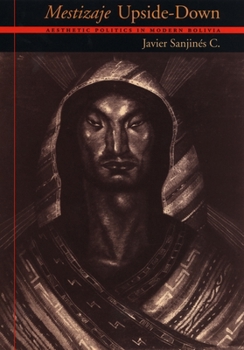Mestizaje Upside-Down: Aesthetic Politics in Modern Bolivia
(Part of the Illuminations: Cultural Formations of the Americas Series)
Mestizaje--the process of cultural, ethnic, and racial mixing of Spanish and indigenous peoples--has been central to the creation of modern national identity in Bolivia and much of Latin America. Though it originally carried negative connotations, by the early twentieth century it had come to symbolize a national unity that transcended racial divides.Javier Sanjines C. contends that mestizaje, rather than a merging of equals, represents a fundamentally Western perspective that excludes indigenous ways of viewing the world. In this sophisticated study he reveals how modernity in Bolivia has depended on a perception, forged during the colonial era, that local cultures need to be uplifted. Sanjines traces the rise of mestizaje as a defining feature of Bolivian modernism through the political struggles and upheavals of the twentieth century. He then turns this concept upside-down by revealing how the dominant discussion of mestizaje has been resisted and transformed by indigenous thinkers and activists. Rather than focusing solely on political events, Sanjines grounds his argument in an examination of fiction, political essays, journalism, and visual art, offering a unique and masterly overview of Bolivian culture, identity, and politics.
Format:Hardcover
Language:English
ISBN:0822942275
ISBN13:9780822942276
Release Date:May 2004
Publisher:University of Pittsburgh Press
Length:226 Pages
Weight:1.10 lbs.
Dimensions:0.9" x 6.2" x 9.2"
Related Subjects
History Political Science Politics & Social Sciences Social Science Social SciencesCustomer Reviews
0 rating





